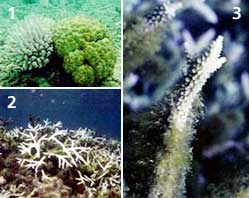Ecology, The Environment and Conservation
This complex theme deals primarily with interactions between organisms and the environmental factors that impact them, but to a greater extent between individual inanimate environmental factors.
innovations-report offers informative reports and articles on topics such as climate protection, landscape conservation, ecological systems, wildlife and nature parks and ecosystem efficiency and balance.

Helping coral reefs survive climate change
While the high ocean surface temperatures during the 1997-98 El Nino bleached coral reefs in more than 50 tropical countries worldwide, patches of coral did survive in or near the damaged reefs. A new study of these patches identifies factors likely to protect these threatened marine ecosystems during climate change.
“As baseline sea surface temperatures continue to rise, climate change may represent the single greatest threat to coral reefs worldwide,” say Jordan West of the U.S. En

Quarries may be last chance for many rare European butterflies
While European environmentalists see quarries as scars in the Earth, these industrial operations may actually play a critical role in preserving rare species. New research shows that quarries provide the only suitable habitat for at-risk butterflies in some places, suggesting that current policies of filling in old quarries are misguided.
“Increasing evidence is revealing the counterproductivity of such practices,” say Jiri Benes, Pavel Kepka and Martin Konvicka, all of the University of So

Clouds reveal Europe’s ozone future
Forget blue skies research, it is clouds that have focused minds at the University of Leicester where scientists are tackling the causes of ozone depletion.
Atmospheric scientists in the Department of Physics and Astronomy are spearheading the MAPSCORE project, a European Commission Environment project which investigates a major cause of ozone depletion – high altitude polar clouds which activate the chlorine originally from CFCs and lead eventually to severe ozone destruction.

Caribbean corals decline 80% in 25 years
Coral reefs across the Caribbean have suffered a phenomenal 80% decline in their coral cover during the past three decades, reveals new research from the University of East Anglia (UEA) and the Tyndall Centre for Climate Change Research, published this week in the international online journal Science Express.
The amount of reef covered by hard corals, the main builders of reef framework, has decreased on average from 50% to just 10% in the last 25 years. Although the majority of the l

Pollutant threat to oyster industry
A study published today reveals that a common industrial chemical causes sexual deformities in oysters, producing large numbers of hermaphrodite animals. The chemical, nonylphenol, is a breakdown product from a surfactant widely used in detergents, dispersing agents, herbicides, spermicides and cosmetics.
Dr Helen Nice who undertook this study at Royal Holloway, University of London, says, ‘Our results may cast doubt on the widespread use of this chemical in many human products including co

17-year study confirms that lead in the soil descends slowly
In a 17-year experiment on Vermont’s Camel’s Hump, three Dartmouth researchers find that lead moves very slowly though the soil. Using the highly accurate technique of isotopic analysis for the first time at this field site, the researchers traced several varieties of lead with different atomic weights.
Their study was published online on July 12 on the Environmental Science & Technology Web site, a journal of the American Chemical Society.
“This definitively supports a few